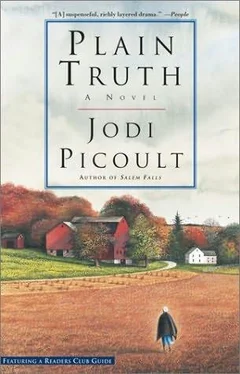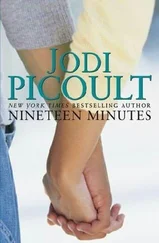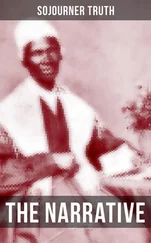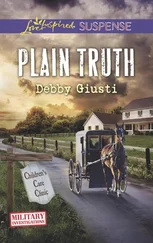“I wouldn’t call it a problem with the case. It’s more like a difficulty in logistics. You see, part of my job requires me to be plugged into technology. I need the tools of my trade to prepare the motions I’ll be sending to the judge, as well as depositions that will come later on. If I hand the judge a handwritten legal text, he’ll laugh me out of court-right after he puts Katie into jail, saying that the bail conditions aren’t working out.”
“You are talking about using a computer?”
“Yes, specifically. Mine will run on batteries, but they’re dead.”
“You can’t get more of these batteries?”
“Not at the local Turkey Hill,” I said. “They’re expensive. I could recharge them, but that requires an outlet.”
“I will not have an outlet on my property,” Aaron interrupted.
“Well, I can’t go into town and charge the battery for eight hours and leave Katie alone here, either.”
The bishop stroked his long, gray beard. “Aaron, you remember when Polly and Joseph Zook’s son had the asthma? You remember how much more important it was for the child to have oxygen than to adhere to the strict letter of the Ordnung? I think this is the same thing.”
“This is not the same at all,” Aaron countered. “This isn’t life or death.”
“Ask your daughter about that,” I shot back.
The bishop held up his hands. At that moment, he looked exactly like every judge I’d ever stood up to in a courtroom. “The computer is not yours, Aaron, and I do not doubt your personal commitment to our ways. But like I told the Zooks, the ends justifies the means, in this case. For as long as the lawyer needs it, I will allow an inverter on this farm, to be used only by Miss Hathaway for the electric.”
“An inverter?”
He turned to me. “Inverters convert twelve-volt current into onehundred ten volt. Our businessmen use them to power cash registers. We can’t use electric straight from a generator, but an inverter, it runs off a battery, which is okay by the Ordnung. Most families can’t have inverters, because there’s too much temptation. You see, the electric goes from diesel to generator to twelve-volt battery to inverter to any appliance-such as your computer.”
Aaron looked appalled. “Computers are forbidden by the Ordnung. And inverters-they’re on probation,” he said. “You could plug a lightbulb into one!”
Ephram smiled. “You could . . . but Aaron, you wouldn’t. I will have someone bring Miss Hathaway an inverter today.”
Clearly miffed, Aaron looked away from the bishop. I was completely confounded by the bargain that had been struck, but grateful all the same. “This will certainly make a difference.”
The bishop’s warm hands enveloped mine, and for a moment, I felt my whole self settle. “You have made adjustments for us, Miss Hathaway,” Ephram said. “Did you think we would not make the same compromises for you?”
I don’t know why the thought of bringing electricity onto the Fishers’ land made me feel a little queasy, as if I were Eve holding out that apple with a come-hither grin. It wasn’t as if I was going to find Katie off in the barn playing Nintendo, for God’s sake. The inverter would probably collect dust between the times I booted up my Thinkpad to do work. Still, I found myself wandering aimlessly away from the barn and the house after the bishop’s decision.
I heard Katie’s voice before I even realized I’d walked to the pond. She sat among a high brace of cattails, almost hidden, her bare feet submerged in the water. “I’m watching,” she said, her eyes fixed on a spot in the middle of the pond where there was absolutely nothing to see. She smiled and clapped, the single audience member for a show of her own making.
Okay, so maybe she was crazy.
“Katie,” I said quietly, startling her. She jumped to her feet, splashing me.
“Oh, I’m sorry!”
“It’s hot. I could use a little spray.” I sat down on the bank. “Who were you talking to?”
Her cheeks flamed. “No one. Just myself.”
“Your sister again?”
Katie sighed, then nodded. “She skates.”
“She skates,” I repeated, deadpan.
“Ja, about six inches above where the water is now.”
“I see. Isn’t she having a little trouble without any ice?”
“No. She doesn’t know it’s summer; she’s just doing what she was doing before she died.” Her voice dropped to a whisper. “She doesn’t seem to hear me, either.”
I looked at Katie for a long moment. Her kapp was slightly askew, a couple of loose tendrils curled about her ears. Her knees were drawn up, arms crossed loosely over them. She was not agitated or confused. She was just staring at the pond, at this alleged vision.
I picked a cattail and twisted the stem. “What I don’t understand is how you believe something you can’t even see, but adamantly refuse to believe something that other people-doctors, and coroners, and my God, even your parents-all know for a fact happened.”
Katie lifted her face. “But I do see Hannah, clear as day, wearing her shawl and her green dress and the skates that got passed down to her from me. And I never saw that baby, until it was already in the barn, wrapped up and dead.” Her brow furrowed. “Which would you believe?”
Before I could answer, Ephram appeared with the deacon. “Miss Hathaway,” the bishop said, “Lucas and I must speak to our young sister here, for a moment.”
Even with the distance between us, I could feel Katie trembling, and the sharp scent of fear rising from her skin. She was shivering in a way that she hadn’t even when a charge of murder was being hung around her neck. Her hand scrabbled over the matted reeds to find mine and slip beneath it. “I would like my lawyer to be present, then,” she said, her voice no more than a whisper.
The bishop looked surprised. “Well, Katie, what for?”
She could not even raise her eyes to the older man. “Please,” she murmured, then swallowed hard.
The deacon and the bishop looked at each other, and Ephram nodded. The trembling, submissive creature beside me was nothing like the girl who’d looked me in the eye and told me there was no baby. She was nothing like the girl who’d spoken to me minutes before about what was visible to one person not being crystal clear to another. But she did bear a striking resemblance to the child I’d seen in court the moment I first arrived, the child who had been ready to let the legal system steamroll her rather than mount a defense.
“It’s like this,” Ephram said uncomfortably. “We know how hard things are, right now, and only bound to be getting more tangled. But there was a baby, Katie, and you being not married . . . well, you need to come to church, and make your things right.”
It was slight, but Katie inclined her head.
With a nod to me, the two men struck off across the field again. It took a full thirty seconds for Katie to get control of herself, and when she did, her face was as pale as a new moon. “What was that about?” I asked.
“They want me to confess to my sin.”
“What sin?”
“Having a baby out of wedlock.” She started walking, and I hurried to keep up with her.
“What will you do?”
“Confess,” Katie said quietly. “What else can I do?”
Surprised, I turned and blocked her path. “You could start by telling them what you told me. That you didn’t have a baby.”
Her eyes filled with tears. “I couldn’t tell them that; I couldn’t.”
“Why not?”
Katie shook her head, her cheeks bright. She ran into the waving sea of corn.
“Why not?” I yelled after her, my frustration rooting me to the ground.
The men who brought the inverter set it up for me in the barn. Attached to the generator beside the calving pen, it gave me a lovely view of the police tape still securing the crime scene, just in case I needed any inspiration to fight Katie’s charges. Shortly after four o’clock I carried my files and my laptop out to the barn and began to act like a lawyer.
Читать дальше












